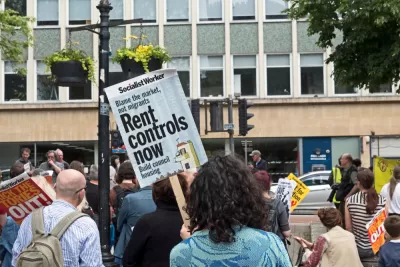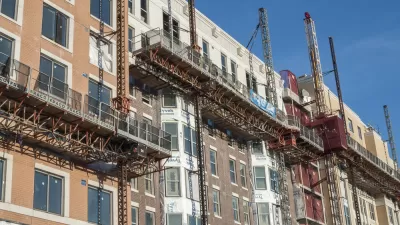A potential precedent setting case against rent control is underway in New York. A Next City article takes an in-depth look at the legal argument made by landlords against the state of New York's new rent control law.

Jared Brey interrogates the legal case presented by landlords in New York in a lawsuit designed to overturn the state's new rent control law.
Here's the gist of the legal argument made by the plaintiffs:
In July, a group of landlords and landlord associations filed the suit [pdf], naming the City of New York and the Rent Guidelines Board as defendants. It’s a long complaint, well over 100 pages, and it attacks the rent stabilization laws from a number of angles. The arguments are aimed at the rent stabilization program as a whole, rather than just the expansions that were recently approved by the legislature. The laws violate due process, they argue. And, they say, by so severely restricting their use of the apartments, the laws amount to a “taking” of landlords’ property under the 5th Amendment.
Furthermore:
The takings argument turns on two concepts. One is that the laws are so onerous that they amount to a “physical taking” of private property by the government — like eminent domain but without any compensation. The other is that they add up to an “uncompensated regulatory taking,” because restricting the amount of rent that landlords can charge lowers the value of the property.
Brey speaks to trio of legal experts for insight about the potential for those arguments to prevail in court, encountering mostly skepticism. There is some agreement, however, that expanded rent control could lower the resale value of multi-family buildings.
FULL STORY: Is Rent Control a ‘Taking’ of Landlords’ Property?

Planetizen Federal Action Tracker
A weekly monitor of how Trump’s orders and actions are impacting planners and planning in America.

Congressman Proposes Bill to Rename DC Metro “Trump Train”
The Make Autorail Great Again Act would withhold federal funding to the system until the Washington Metropolitan Area Transit Authority (WMATA), rebrands as the Washington Metropolitan Authority for Greater Access (WMAGA).

The Simple Legislative Tool Transforming Vacant Downtowns
In California, Michigan and Georgia, an easy win is bringing dollars — and delight — back to city centers.

The States Losing Rural Delivery Rooms at an Alarming Pace
In some states, as few as 9% of rural hospitals still deliver babies. As a result, rising pre-term births, no adequate pre-term care and harrowing close calls are a growing reality.

The Small South Asian Republic Going all in on EVs
Thanks to one simple policy change less than five years ago, 65% of new cars in this Himalayan country are now electric.

DC Backpedals on Bike Lane Protection, Swaps Barriers for Paint
Citing aesthetic concerns, the city is removing the concrete barriers and flexposts that once separated Arizona Avenue cyclists from motor vehicles.
Urban Design for Planners 1: Software Tools
This six-course series explores essential urban design concepts using open source software and equips planners with the tools they need to participate fully in the urban design process.
Planning for Universal Design
Learn the tools for implementing Universal Design in planning regulations.
Smith Gee Studio
City of Charlotte
City of Camden Redevelopment Agency
City of Astoria
Transportation Research & Education Center (TREC) at Portland State University
US High Speed Rail Association
City of Camden Redevelopment Agency
Municipality of Princeton (NJ)





























